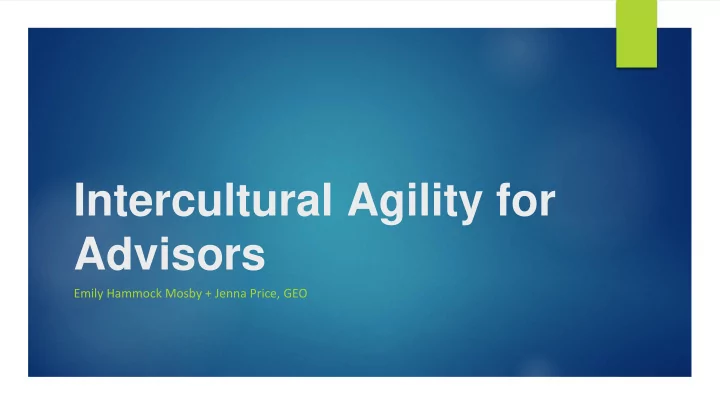

Intercultural Agility for Advisors Emily Hammock Mosby + Jenna Price, GEO
What is Intercultural Agility – and Why Do I Need It? ▶ Intercultural agility is the ability to communicate and behave EFFECTIVELY and APPROPRIATELY with people from other cultures ▶ As an advisor, you encounter people with cultural backgrounds that are different from yours on a daily basis. ▶ Understanding cultural differences – and how to navigate them – will make you more effective in your work and help you understand the people around you. ▶ Appreciating culture means appreciating where your students come from – and how best to help them meet their goals!
What is Culture? And Why Do Cultures Differ? Culture: “a learned set of shared interpretations about beliefs, values, norms, and ▶ social practices, which affect the behaviors of a relatively large group of people” (Lustig and Koester 2013, 25). Culture provides a tailored response to a unique set of conditions – geography, ▶ ecology, biology, history, etc. Culture provides a common frame of references so that people in close proximity to ▶ one another more easily understand and coordinate actions, relationships, and responses to outside forces.
The Iceberg Model https://www.slideshare.net/MotazHajajMSCSMA/cultural-differences-between-the-united-states-and-saudi-arabia
But First …Know Thyself What identities are important to you? ▶ Racial ▶ Ethnic ▶ Regional ▶ Gender ▶ Sexuality ▶ Religion, etc. ▶ What values do you live by? ▶ Generosity ▶ Respect ▶ Bravery ▶ Individualism, etc. ▶ Which identities or values might be challenged in your ▶ environment?
Using Cultural Dimensions for Intercultural Competence ▶ Cultural dimensions provide generalizations about “national character” and how to compare culture to culture ▶ Americans culture is identified as egalitarian, individualistic, competitive, risk tolerant, monochromic, indulgent, direct, and universalist. ▶ How does this compare to YOUR identity? ▶ Once you know what YOUR cultural profile is, you can predict where conflict or confusion may arise ▶ Prepare yourself, and think about how best to diffuse these situations
Egalitarian vs Hierarchical Disagree Strongly - 1 – 2 – 3 – 4 – 5 - Agree Strongly I generally prefer a formal, structured advising environment. ▶ I like for my supervisor to tell me what to work on in what order. ▶ I think people should acknowledge rank based on age and position. ▶ I like to have a clear definition of my role as during group work. ▶ I prefer to have my work checked my by supervisor often. ▶
Time Orientation Disagree Strongly - 1 – 2 – 3 – 4 – 5 - Agree Strongly I think that being on time is a sign of respect and competence. ▶ I believe you should meet a deadline, no matter what. ▶ Advising sessions should be short and to the point. ▶ If someone is taking too long, it is ok to interrupt them. ▶ Time is completely under my control. ▶ Time management is an important skill. ▶
Compare Country Profiles https://www.hofstede-insights.com/product/compare-countries/
Tips for Being Interculturally Savvy Do Not ▶ Do ▶ Assume you know a person’s cultural identity – Ask questions about a student’s background and listen to ▶ ▶ remember how much is “beneath the surface” their stories Base assumptions on negative stereotypes Use generalizations to make informed predictions and ▶ ▶ strategies Consider cultural difference a barrier ▶ Students from diverse backgrounds have a rich skill ▶ Expect to be unaffected by encounters with cultural ▶ difference Predict what might affect you most ▶ Lose control of your emotions ▶ Be aware of yourself + practice coping strategies ▶ Isolate yourself away from groups you don’t Find a cultural mentor and ask questions! ▶ ▶ understand Try things a different way – people do it for a reason! ▶ Assume “your way” is the “right way” ▶ Enjoy the learning experience and aim to improve your ▶ Let cultural differences negatively impact your work cultural agility ▶
Critical Incidents and Questions
Recommend
More recommend